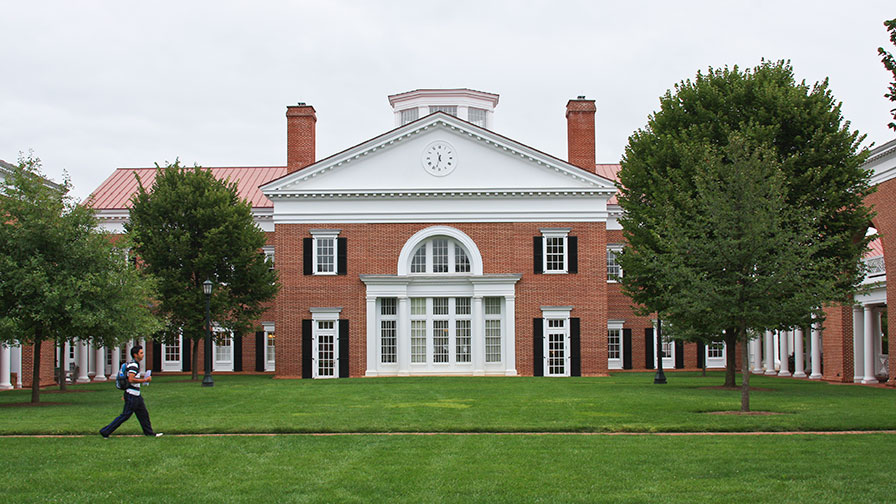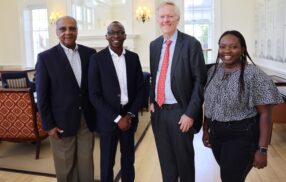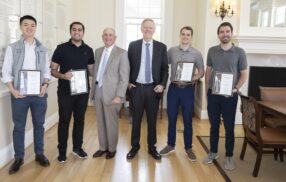
The Drafting of the New NFL Deal Discussed at the Darden School
“I think the reason the deal got done was the owners became convinced that we would not play for a year,” said DeMaurice Smith, executive director of the National Football League Players Association, who rescued the 2011–2012 American football season.
In March 2011, when a four-and-a-half month NFL lockout began, Smith visited the University of Virginia Darden School of Business and discussed how NFL owners offered the players he represents “the worst deal in the history of sports.” Last August, NFL players and owners reached an agreement. On 13 February 2012, on the heels of the 46th annual Super Bowl game that almost wasn’t, Smith revisited Darden to discuss the new 10-year labor deal he helped broker. The move put players back on the field and made football fans ecstatic.
“If the other side has an ability to prevent you from going into that negotiating room as an equal partner, all those hopes for how the deal ends go where? Yes, they go there, a blank hole,” he said, pointing animatedly towards the floor.
Smith explained his strategy for getting NFL owners to the negotiating table by successfully gaining access to their $4 billion lockout fund and providing the players with a $600 million insurance policy if they had to go a year without playing.
Former NFL player and Class of 2012 MBA student Scott Jackson led the dynamic discussion with Smith. The Black Business Student Forum and the Darden Leadership Speaker Series co-sponsored the fireside chat.
Spectators came from all over University of Virginia Grounds, including the UVA School of Law, Smith’s alma mater.
Nothing was off limits.
Jackson asked, “So what keeps you up at night now?”
“The transition from war mode to peace mode is a very interesting transition,” explained Smith. “You have a challenge, at least anecdotally, for our players to maintain wealth after football’s over. You still have a number of metrics that will not go away, such as a three-and-a-half year career. Our players are going to be nonplayers for longer than they were players. How do we make a transition from a history where football has done a good job of using our players to a system where our players use football?”
Jackson also asked Smith, or “D” as he is sometimes called, how he would convince Darden’s business students, primarily trained in general management, that labor unions are good. Smith initially took off his jacket in jest, playfully signaling that he was ready for a challenge. Then Smith took a moment to be serious and said there has to be a balance. He expressed that it is not good when one party has so much leverage that they can prevent positive actions from happening. Citing changes stemming from the NFL Players Association 2011 collective bargaining agreement, including the elimination of “two-a-days,” a dreaded term describing when teams hold two practices per day for several weeks during the pre-season, Smith discussed how advocacy in the form of unions helps spur progress and safety.
“Until this collective bargaining agreement, this was the first one where every medical professional has to adhere to every federal, state, local and professional standard,” said Smith. “Until 2010, the head of the NFL’s concussion committee was a rheumatologist. There were no limits on contact at any of your practices. A coach could have as much head-to-head contact every day, every hour of the day, that he wanted to. All four of those things changed because a union was able to stand on its own feet and force changes that are good.”
A board of active player representatives unanimously elected Smith to the executive director post of the NFL Players Association in 2009. Prior to his election, he was a trial lawyer and litigation partner at the Washington, D.C., law firm Patton Boggs LLP. Before entering private practice, Smith served as counsel to former Deputy Attorney General Eric Holder in the U.S. Department of Justice. Smith is a graduate of the University Of Virginia School of Law, where he teaches courses on trial advocacy. He also teaches at George Washington University and American University.
Watch the full video of Smith’s fireside chat.
The University of Virginia Darden School of Business prepares responsible global leaders through unparalleled transformational learning experiences. Darden’s graduate degree programs (MBA, MSBA and Ph.D.) and Executive Education & Lifelong Learning programs offered by the Darden School Foundation set the stage for a lifetime of career advancement and impact. Darden’s top-ranked faculty, renowned for teaching excellence, inspires and shapes modern business leadership worldwide through research, thought leadership and business publishing. Darden has Grounds in Charlottesville, Virginia, and the Washington, D.C., area and a global community that includes 18,000 alumni in 90 countries. Darden was established in 1955 at the University of Virginia, a top public university founded by Thomas Jefferson in 1819 in Charlottesville, Virginia.
Press Contact
Molly Mitchell
Associate Director of Content Marketing and Social Media
Darden School of Business
University of Virginia
MitchellM@darden.virginia.edu





